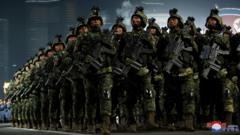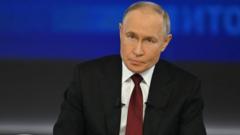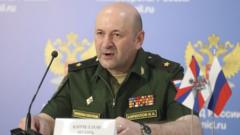Ukraine has taken credit for a significant assassination in Moscow, claiming responsibility for the death of Russian General Igor Kirillov, who was involved in the military’s nuclear and chemical weapons strategies.
Ukraine Claims Responsibility for Assassinating Russian General in Moscow

Ukraine Claims Responsibility for Assassinating Russian General in Moscow
The assassination of General Igor Kirillov highlights escalating covert actions in the ongoing Ukraine conflict.
Despite warnings from U.S. officials about potential fallout from this action, Ukraine has intensified its covert operations, previously targeting high-ranking Russian officials. The geopolitical implications of this event could be far-reaching.
In a dramatic turn of events, Ukraine has announced its involvement in the assassination of Igor Kirillov, a general within the Russian military responsible for overseeing nuclear and chemical weapons protection forces. His death occurred following the detonation of an explosive device in a residential area of Moscow, marking one of the most audacious strikes against Russian military leadership since the onset of the full-scale invasion nearly three years ago.
Reports indicate that both Kirillov and an aide were killed in this carefully orchestrated attack, with Ukrainian authorities branding Kirillov a criminal, alleging his role in the "widespread use of banned chemical weapons" against Ukraine. His high-profile position not only placed him at the helm of critical military operations but also made him a central figure in Russia’s propaganda efforts against Ukraine and its Western allies.
In the wake of the assassination, a senior official from the U.S. government indicated that there was no prior warning regarding the operation, cautioning that it could provoke a harsh response from Russian President Vladimir Putin. This underscores the potential risks of escalating actions amid a volatile conflict.
Adding to the tension, North Korea's involvement in the war has become a point of concern as U.S. intelligence has reported that North Korean forces assisting Russia in the Ukrainian conflict may have begun to incur casualties. This development underscores the interconnectedness of various geopolitical interests amid the ongoing conflict.
This recent assassination fits into a broader trend of Ukraine’s increased capacity for covert operations, which, last month, also saw Ukrainian forces claiming responsibility for a car bombing in Crimea that killed another senior Russian commander. As these incidents unfold, the ramifications for strategic military engagements and international relations are yet to be fully understood, prompting global observers to closely monitor developments on both sides.
In a dramatic turn of events, Ukraine has announced its involvement in the assassination of Igor Kirillov, a general within the Russian military responsible for overseeing nuclear and chemical weapons protection forces. His death occurred following the detonation of an explosive device in a residential area of Moscow, marking one of the most audacious strikes against Russian military leadership since the onset of the full-scale invasion nearly three years ago.
Reports indicate that both Kirillov and an aide were killed in this carefully orchestrated attack, with Ukrainian authorities branding Kirillov a criminal, alleging his role in the "widespread use of banned chemical weapons" against Ukraine. His high-profile position not only placed him at the helm of critical military operations but also made him a central figure in Russia’s propaganda efforts against Ukraine and its Western allies.
In the wake of the assassination, a senior official from the U.S. government indicated that there was no prior warning regarding the operation, cautioning that it could provoke a harsh response from Russian President Vladimir Putin. This underscores the potential risks of escalating actions amid a volatile conflict.
Adding to the tension, North Korea's involvement in the war has become a point of concern as U.S. intelligence has reported that North Korean forces assisting Russia in the Ukrainian conflict may have begun to incur casualties. This development underscores the interconnectedness of various geopolitical interests amid the ongoing conflict.
This recent assassination fits into a broader trend of Ukraine’s increased capacity for covert operations, which, last month, also saw Ukrainian forces claiming responsibility for a car bombing in Crimea that killed another senior Russian commander. As these incidents unfold, the ramifications for strategic military engagements and international relations are yet to be fully understood, prompting global observers to closely monitor developments on both sides.





















